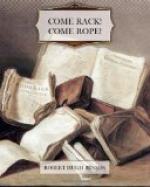So, again in silence, he went up the court, knowing that eyes were upon him, yet showing no sign that he knew it; he went up the steps with the same assured air, and disappeared into the hall.
* * * * *
Then the spell broke up and the bustle began, for it was only half an hour to dinner and guests were coming. First Dick came out, slashing to the door behind him, and strode out to the gate. He was still in his boots, for he had ridden to Padley and back since early morning with a couple of the maids and the stable-boy. He went to the gate of the court, the group dissolving as he came, and shut it in their faces. A noise of talking came out of the kitchen windows and the clash of a saucepan: the maids’ heads vanished from the upper windows.
Even as Dick shut the gate he heard the sound of horses’ hoofs down by the porter’s lodge. The justices were coming—the two whose names he had heard with amazement last week, as the last corroboration of the incredible rumour of his master’s defection. For these were a couple of magistrates—harmless men, indeed, as regarded their hostility to the old Faith—yet Protestants who had sat more than once on the bench in Derby to hear cases of recusancy. Old Mrs. Marpleden had told him they were to come, and that provision must be made for their horses—Mrs. Marpleden, the ancient housekeeper of the manor, who had gone to school for a while with the Benedictine nuns of Derby in King Henry’s days. She had shaken her head and eyed him, and then had suffered three or four tears to fall down her old cheeks.
Well, they were coming, so Dick must open the gate again, and pull the bell for the servants; and this he did, and waited, hat in hand.
Up the little straight road they came, with a servant or two behind them—the two harmless gentlemen, chattering as they rode; and Dick loathed them in his heart.
“The squire is within?”
“Yes, sir.”
They dismounted, and Dick held their stirrups.
“He has been to church—eh?”
Dick made no answer. He feigned to be busy with one of the saddles.
The magistrate glanced at him sharply.
V
It was a strange dinner that day.
Outwardly, again, all was as usual—as it might have been on any other Sunday in spring. The three gentlemen sat at the high table, facing down the hall; and, since there was no reading, and since it was a festival, there was no lack of conversation. The servants came in as usual with the dishes—there was roast lamb to-day, according to old usage, among the rest; and three or four wines. A little fire burned against the reredos, for cheerfulness rather than warmth, and the spring sunshine flowed in through the clear-glass windows, bright and genial.




